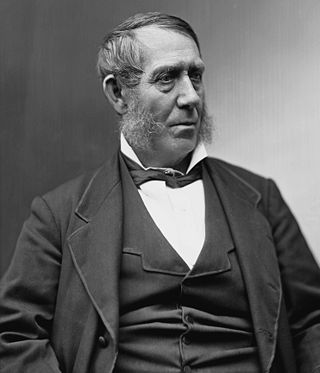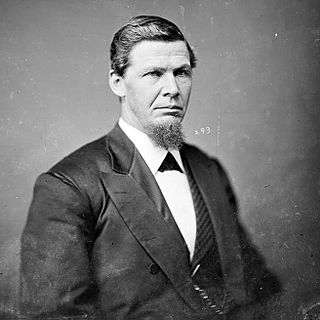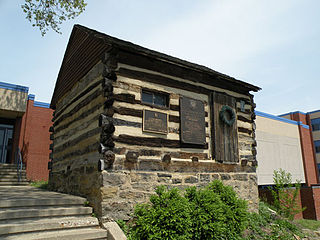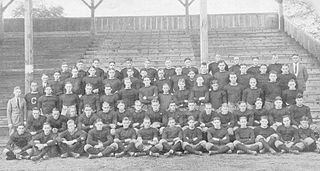
Samuel Jordan Kirkwood was an American politician who twice served as governor of Iowa, twice as a U.S. Senator from Iowa, and as the U.S. Secretary of the Interior.

Morehouse College is a private historically Black, men's, liberal arts college in Atlanta, Georgia. Anchored by its main campus of 61 acres (25 ha) near Downtown Atlanta, the college has a variety of residential dorms and academic buildings east of Ashview Heights. Along with Spelman College, Clark Atlanta University, and the Morehouse School of Medicine, the college is a member of the Atlanta University Center consortium.

The Big Eight Conference was a National Collegiate Athletic Association (NCAA)-affiliated Division I-A college athletic association that sponsored football. It was formed in January 1907 as the Missouri Valley Intercollegiate Athletic Association (MVIAA) by its charter member schools: the University of Kansas, University of Missouri, University of Nebraska, and Washington University in St. Louis. Additionally, the University of Iowa was an original member of the MVIAA, while maintaining joint membership in the Western Conference.

John Campbell Merriam was an American paleontologist, educator, and conservationist. The first vertebrate paleontologist on the West Coast of the United States, he is best known for his taxonomy of vertebrate fossils at the La Brea Tar Pits in Los Angeles, particularly with the genus Smilodon, more commonly known as the sabertooth cat. He is also known for his work to extend the reach of the National Park Service.

Washington & Jefferson College is a private liberal arts college in Washington, Pennsylvania. The college traces its origin to three Presbyterian missionaries in the 1780s: John McMillan, Thaddeus Dod, and Joseph Smith. Early schools grew into two competing academies, with Jefferson College located in Canonsburg and Washington College located in Washington. The two colleges merged in 1865 to form Washington & Jefferson College. The 60-acre (24 ha) campus has more than 40 buildings, with the oldest dating to 1793. The college has a strong history of competing literary societies, dating back before the union of Jefferson and Washington Colleges. The athletic program competes in NCAA Division III. Nearly all students live on campus and roughly one third are members of fraternities or sororities.

Samuel Black McCormick was an attorney, Presbyterian clergyman, and educator who served as the third president of Coe College and the ninth Chancellor of the University of Pittsburgh.

Lenox College was a college in Hopkinton, Iowa that operated from 1859 until its closure in 1944. The institution was initially known as Bowen Collegiate Institute. The name was changed to Lenox Collegiate Institute in October 1864 and to Lenox College in 1884.

Charles Ogle was an American attorney and politician who served as an Anti-Masonic and Whig member of the United States House of Representatives from Pennsylvania.

Samuel Addison Oliver was an American pioneer, lawyer, judge, and politician from western Iowa.

The 1922 Rose Bowl was a college football bowl game played on January 2, 1922, between the Washington & Jefferson Presidents (W&J) and the California Golden Bears. It holds several distinctions including being the only scoreless Rose Bowl Game, the first tie in a Rose Bowl, the first African-American quarterback to play in the Rose Bowl, the first freshman to play in a Rose Bowl, and Hal Erickson (W&J) became the only man ever to play in two Rose Bowls, with two teams, without losing. It was also the last to be played at Tournament Park and to be officially known as the Tournament East-West Football Game, and with only 450 students at the time, Washington & Jefferson College was the smallest school to ever play in a Rose Bowl.

Monticello is a city in Jones County, Iowa, United States. As of the 2020 census, the city population was 4,040.
Samuel Black (1780–1840) was a Canadian fur trader and explorer.

The Washington & Jefferson Presidents are the intercollegiate athletic teams for Washington & Jefferson College. The name "Presidents" refers to the two presidential namesakes of the college: George Washington and Thomas Jefferson. W&J is a member of the Presidents' Athletic Conference, the Eastern College Athletic Conference, and play in Division III of the National Collegiate Athletic Association in both men's and women's varsity sports. During the 2005–2006 season, 34 percent of the student body played varsity-level athletics.

The Washington & Jefferson Presidents football team represents Washington & Jefferson College in collegiate level football. The team competes in NCAA Division III and is affiliated with the Presidents' Athletic Conference (PAC). Since its founding in 1890, the team has played their home games at College Field, which was remodeled and renamed Cameron Stadium in 2001.

The 1921 college football season had no clear-cut champion, with the Official NCAA Division I Football Records Book listing California Golden Bears, Cornell Big Red, Iowa Hawkeyes, Lafayette Leopards, Washington & Jefferson Presidents, and Vanderbilt Commodores as champions. Only California, Cornell, Iowa, and Lafayette claim national championships for the 1921 season.

The history of Washington & Jefferson College begins with three log cabin colleges established by three frontier clergymen in the 1780s: John McMillan, Thaddeus Dod, and Joseph Smith. The three men, all graduates from the College of New Jersey, came to present-day Washington County to plant churches and spread Presbyterianism to what was then the American frontier beyond the Appalachian Mountains. John McMillan, the most prominent of the three founders because of his strong personality and longevity, came to the area in 1775 and built his log cabin college in 1780 near his church in Chartiers. Thaddeus Dod, known as a keen scholar, built his log cabin college in Lower Ten Mile in 1781. Joseph Smith taught classical studies in his college, called "The Study" at Buffalo.

The 1921 Washington & Jefferson Presidents football team represented the Washington & Jefferson College during the 1921 college football season. Coached by Greasy Neale, went 10–0 in the regular season, defeating Pitt, University of Detroit, and Syracuse. The 7–0 victory over rival Pitt was celebrated with a day of canceled classes and a bonfire with inspirational speeches in front of the Washington County Courthouse. As the best team from the east, W&J was invited to the 1922 Rose Bowl to play the best team from the west: the undefeated and heavily favored California Golden Bears. Some had even begun to call Cal the best team in college football history. The Red and Black sent 20 men on the cross-country trip and Robert M. Murphy mortgaged his home to pay his six family members’ way. W&J would be the last Rose Bowl team to play the same 11 men the entire game. During the train ride to Pasadena, in which Greasy Neale continued to prepare his men, Lee Spillers caught pneumonia and could not finish the journey. Ross "Bucky" Buchannan, a reserve player who had stowed away on the train and was fed smuggled sandwiches during the trip, was available to fill Spillers' roster spot.

The history of slavery in Colorado began centuries before Colorado achieved statehood when Spanish colonists of Santa Fe de Nuevo México (1598–1848) enslaved Native Americans, called Genízaros. Southern Colorado was part of the Spanish territory until 1848. Comanche and Utes raided villages of other indigenous people and enslaved them.


















